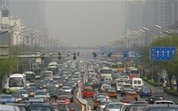 BEIJING (Reuters) – Pollution levels rose sharply in Beijing on Tuesday, just 2-1/2 months before the Olympic Games in the city, prompting authorities to warn residents with respiratory problems to stay inside. Air quality in the capital was rated as “heavily polluted” due to a sandstorm from Mongolia, the Beijing Environmental Protection Bureau said on its website (www.bjepb.gov.cn).
BEIJING (Reuters) – Pollution levels rose sharply in Beijing on Tuesday, just 2-1/2 months before the Olympic Games in the city, prompting authorities to warn residents with respiratory problems to stay inside. Air quality in the capital was rated as “heavily polluted” due to a sandstorm from Mongolia, the Beijing Environmental Protection Bureau said on its website (www.bjepb.gov.cn).
The bureau advised people susceptible to particles in the air to avoid outdoor activities.
Such sandstorms usually hit the city in March and April.
Beijing’s pollution has already proved a major concern for athletes, with twice Olympic champion Haile Gebrselassie, who suffers from asthma, pulling out of the men’s marathon out of concern for his health.
In addition to shutting down high polluters within city limits, Beijing has demanded five surrounding provinces scale back or stop production to ensure blue skies hang over Olympic venues for the Games in August.
State media also reported China had launched a second weather satellite on Tuesday to help improve forecasts for the Beijing Games.
Detailed weather predictions are important because climatic conditions can have a major impact on Beijing’s attempts to rid the skies of pollution for the Games.
The International Olympic Committee (IOC) has said that some endurance events might have to be shifted if the air quality is not good enough and the earlier they know about that possibility, the easier it is to re-schedule.
There are also concerns that rain, which is common in early August in the Chinese capital, might ruin the opening ceremony at the roof-less Bird’s Nest National Stadium on August 8.
Attempts to counter the threat by weather manipulation are also reliant on accurate forecasts. Beijing authorities have claimed some success in stopping rain over limited areas by firing chemicals into clouds.
The 2,295-kg satellite Fengyun-3 will provide mid-range forecasts over 10 to 15 days, Xinhua news agency reported.




